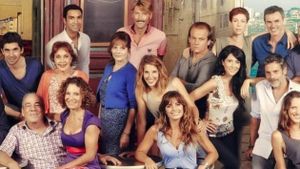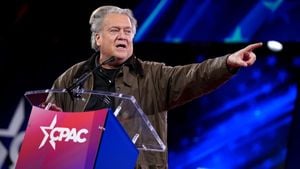Berlin - The political stage is set for Germany as candidates prepare for the upcoming Bundestag election this Sunday, February 23, 2025. The final debate, dubbed the "Schlussrunde," aired on February 20, 2025, providing one last chance for the leaders of established parties to sway undecided voters. Moderated by the notable teams from ARD and ZDF, the debate saw the likes of Carsten Linnemann (CDU), Matthias Miersch (SPD), and Annalena Baerbock (Greens) bring their platforms to the forefront of public discussion.
This pivotal event unfolded amid heightened tensions around pressing issues such as economic stability, climate change, and Germany's role on the international stage. With just days to go until the election, candidates aimed to clarify their positions and ignite passion among the electorate. Baerbock, representing the Greens, directly addressed the pressing concern of national security linked to the complicated dynamics of U.S. foreign policy. "Without the support of the USA, the risk of war for Germany is increasing," she asserted, framing foreign assistance as integral to European stability.
Matthias Miersch of the SPD echoed these sentiments, highlighting the importance of government preparedness, yet acknowledged the challenge of financing defense initiatives. He stated, "Our government is well-prepared, but financing our defenses remains a pressing issue." Carsten Linnemann, on the opposing side from the CDU, countered with skepticism toward the current administration, claiming, "This government is de facto isolated," indicating the need for a shift toward new priorities.
The debate also delved deep to address the controversial topics surrounding military service and its potential reintegration. Alice Weidel from the AfD called for military service to be reinstated, proclaiming, "We need to put the army back on trial," which prompted lively discussions around national defense capabilities and youth responsibilities.
Through back-and-forth exchanges, the debate showcased the chaotic nature of political discourse. Moderator Markus Preiß highlighted this disarray stating, "This debate has shown us what is important," pointing out the overwhelming cacophony as candidates often spoke over one another, vying for attention and influence.
Going beyond economic and security concerns, health policies also emerged as contenders for discussion. Weidel attempted to link healthcare costs to migration, stating, "The migration-related increase in costs must be addressed," leading to sharp rebuttals from competitors citing contributions made by immigrants within the healthcare sector.
Polls leading up to the debate have shown fluctuated figures among the major parties. The latest ZDF poll indicated the CDU at 28%, the AfD at 21%, and small but significant parties like the BSW and FDP struggling around the 5% threshold necessary for parliamentary entry. Notably, over 27% of voters remain undecided, dramatically underscoring the significance of every exchange during this televised showdown.
The debate concluded with all candidates reflecting on their performances and the overall tone of the campaign, which many claimed was unfair, evidenced when they all raised their hands affirmatively when asked if they had conducted themselves fairly—yet decried the fairness of how they were treated.
With the Bundestag election just around the corner, this last debate served not only as a platform for policy but as part and parcel of the larger electoral strategy—aimed at securing votes, thriving on urgency, and providing clarity amid the murky waters of political discourse.



